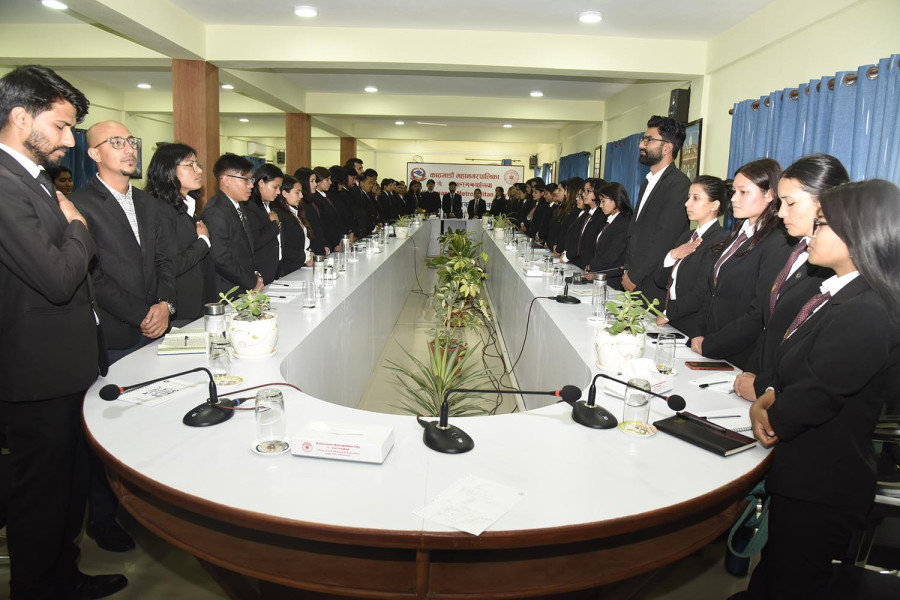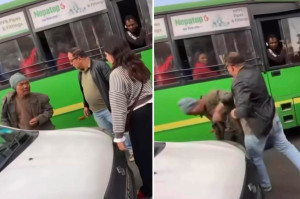Kathmandu
KMC signs law students for free legal help at wards
The drive is welcomed as a step towards localising the justice delivery system.
Anup Ojha
For the first time in its history, the Kathmandu Metropolitan City is providing free legal consultancy services at all of its 32 wards starting March 15.
The City plans to deploy students from the Nepal Law Campus at ward offices to help service seekers with legal work. The students will help them with writing applications, lodging complaints, and furnishing replies. This is expected to especially help those who are uneducated and are unfamiliar with legal work.
Basanta Acharya, information officer at the City, said the goal is to help citizens who can’t read and write. “The students will help them prepare and submit documents,” he said.
On January 17, the City and Nepal Law Campus signed an agreement, deciding to deploy as many as 50 students, including 44 pursuing a BA-LLB degree and six LLM students, for the drive, which is under the judicial committee led by Deputy Mayor Sunita Dangol.
At each local unit, the deputy mayor or deputy chair oversees all judicial affairs. Article 217 of the constitution authorises the deputy chief of a local unit to head the judicial committee and settle legal issues. Article 217 (1) says a three-member judicial committee is coordinated by the vice-chair in a village body and by the deputy mayor in a municipality, in order to settle disputes under their respective jurisdictions.
According to Acharya, who is also a legal adviser to the KMC, 32 BA-LLB students will be deployed in all wards from mid-March. Three LLM students will be stationed at the City’s head office as legal advisers, while the remaining ones will be deployed alternatively.
The City will pay Rs15,000 a month to each student for their services. As per the agreement, the pilot exercise will end in mid-June.
Officials said senior citizens and people with disabilities will get priority for such services.
All 50 law students were given a one-day orientation last week to familiarise them with local issues and ways to resolve local problems such as family disputes. Other help these law students will provide include lodging complaints of violence against women, sexual violence, and cases related to land encroachment, building map issues, and legal consultations.
Speaking at the orientation last week, Deputy Mayor Dangol, head of the judicial committee, said cooperation and coordination with the Nepal Law Campus will help the City to speed up justice delivery at the grassroots level.
“Justice delayed is justice denied,” Dangol said, addressing attendees. “When multiple disputes in the metropolis make it to the City office, it can’t resolve all of them even if it wants to. I believe all of you will facilitate this drive that aims to speed up justice delivery in each ward.”
The Nepal Law Campus has also welcomed the drive that it believes will help train its students on the field. DN Parajuli, the campus head, said a new avenue had been opened for students to practise law at the local level, and it would enhance their practical knowledge which in turn is essential for them to be good lawyers.
“I would call it localisation of the justice system,” Parajuli said. “If you look at medical students, they are sent to hospitals to practise medicine. Likewise, it is important for law students to practise law. The City’s approach is thus commendable.”
Parajuli added that senior law students and professors will help on-field trainees crack complex cases.
Parajuli said although localisation of the justice system is common in countries like the United States and Indonesia, this is a new practice in Nepal.
After KMC’s initiative, other local bodies in the Valley are also approaching the campus for similar collaborations, Parajuli said.
“We are in the trial phase, and I am sure this is going to succeed,” he said. “But we will tie up with other local units only after the trial period with the KMC ends.”




 13.12°C Kathmandu
13.12°C Kathmandu.jpg)











